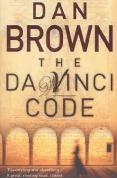You may think it is strange to be writing a review of The Da Vinci Code three years after its release in 2003. However, in light of the court case surrounding which began on February 27, ideas about copyright and the act of fiction-writing need to be considered.
Briefly, writers of The Holy Blood and the Holy Grail, Michael Baigent and Richard Leigh, are suing Random House, the publishers of Dan Brown's The Da Vinci Code, on a claim that he
 lifted ideas from their 1982 publication for his novel.
lifted ideas from their 1982 publication for his novel.This court case seems to be a jealous attack on Brown’s novel, which has sold 40 million copies to date, compared with non-fiction The Holy Blood and the Holy Grail’s two million. Baigent and Leigh appear to be making a desperate attempt for publicity and the scary fact is that their case has a good chance.
Brown's novel has not grown in popularity simply because he stole ideas from Baigent and Leigh's book about Jesus Christ having children and not dying on the cross. On the contrary, Brown is one of the cleverest writers of modern times, managing to write to a massive audience.
The Da Vinci Code is at once a gripping thriller, a detective novel, an alternative history and a puzzle solver. To clarify, two years ago when I went on holiday, I was overwhelmed by the vast number of copies of the novel being read around the pool. For a book that popular to make it onto my reading list for English Literature at the University of Manchester is incredible. It is, as Brown intended, a springboard for debate about religion in all circles of society.
The book is truly a page-turner, action moves at break-neck speed. Small chapters and various sharp switches in perspective increase suspense to the limit. So in essence, Baigent and Leigh are agitated because Dan Brown managed to make a complex and shocking interpretation of history not only interesting to mainstream popular culture, but also incredibly exciting.
It is perhaps the blurring of fact and fiction in the novel that made it more of an intense read, made more tangible by Brown's prelude to the novel entitled Fact. He includes The Priory of Sion, Opus Dei and references to architecture, artwork and secret rituals in this list. This in all probability contributed to much controversy about the novel, but this happens everywhere. It is hard to think of a writer who does not allude to history at all, or have an interpretation of historical events. However, as a writer of fiction, does Brown not have the artistic license to take these historical ideas and take whatever perspective he desires? Surely this is a mark of good fiction writing - taking an obscure argument and convincing millions to question deeply rooted ideas in society. In addition, a question raised by Brown himself adds much clarity to my argument: How historically accurate is history itself?
The Da Vinci Code is circulating at a perfect time in society - a time when people are questioning beliefs and becoming interested in conspiracy theories. Whatever happens in the court case, the novel will go down in history, and will be debated and studied for years to come. I want to admire this book for its wonderful capability to keep readers on the edge of their seat throughout. It is not necessary to chastise Dan Brown for his views; like he says, readers can make their own minds up about the material. The only thing that differentiates Dan Brown from you and I is that he wrote his opinions down and earned millions for doing so. Copyright laws protect writers from having their actual text lifted, but if ideas were to be included in copyright laws following the court case, all artists would have much trouble publishing anything.
Author: Alison Bramley
Manchester iJourno group

0 Comments:
Post a Comment
<< Home